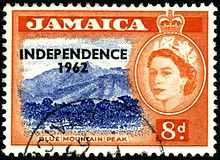
May 30, 2013, by Harry Cocks
Britain’s Cold War in the Caribbean
Some historians such as the bullish right-wing TV pundit Niall Ferguson have tried to celebrate the British Empire as a kind of civilising mission and a genuinely co-operative endeavour between coloniser and colonised. Britain’s imperium, they suggest, should be a model for the current troubled nation-building efforts of the USA. It might be thought that the story of apparently peaceful decolonisation followed by the violence and corruption which scarred the politics of many newly independent states lends some credence to this view of history. However, in a new book, Ordering Independence: The End of Empire in the Anglophone Caribbean 1947-1969 (Palgrave 2012) and a recent article, Dr Spencer Mawby argues that the former British rulers at times actively discouraged democracy in their former colonies. In fact the process of decolonisation in the apparently placid West Indies reflected wider Cold War tensions, and British policy was guided as much by distrust and obstruction of local politics as by mutual assistance or consensus. Far from encouraging democratic and egalitarian politics, or closer links to the former mother country, Dr Mawby argues that British policy in the Caribbean was governed by conflict and paranoia over the Cold War, the politics of aid, and questions of migration to Britain. For instance, anxieties about communism led the colonial authorities to ban leftist literature, place some citizens under surveillance and restrict freedom of movement for political activists, while fears of the effects of racial mixing as a consequence of the migration of Caribbean people to Britain encouraged restrictions on immigration. While the British tended to blame the locals for various political setbacks, such as the collapse of the West Indies Federation in 1962, Dr Mawby suggests that a large part of the responsibility lies with British policy-makers who resisted nationalist efforts to advance the case for a more democratic and egalitarian politics across the formerly British Caribbean. This was particularly evident in their reluctance to transfer power to local elected representatives and in their determination to retain emergency powers which could be used, as they were in the case of Guiana, to oust radical governments with a popular mandate. In his article for Cold War History (see link below), Dr Mawby also outlines how Cold War tensions and anti-communist paranoia led British officials to launch their own McCarthyite campaign of harassment and intimidation against the Jamaican trade unionist Ferdinand Smith and his associates. Smith’s efforts to move the Caribbean labour movement away from its conservative roots and his links with the communist World Federation of Trade Unions exposed the neuroses of imperial policy-makers. Purportedly liberal figures such as the Governor of Jamaica, Hugh Foot, were eager to strengthen the autocratic powers of the late imperial state and in doing so they laid the groundwork for a new era of authoritarian politics in the post-independence period. It would appear that even in the British West Indies, where post-colonial conflicts did not seem obviously rancorous or violent, and where individual states retained close ties to the former coloniser, there was plenty of room for mistrust and the development of Cold War tensions.
Book: Ordering Independence: The End of Empire in the Anglophone Caribbean
http://www.palgraveconnect.com/pc/doifinder/10.1057/9781137262899
Article: “Mr. Smith Goes to Vienna: Britain’s Cold War in the Caribbean 1952-1954” Cold War History
http://www.tandfonline.com/eprint/fYJxeBWvAEwYAWchDugj/full

Although we were made to believe that the peaceful decolonization was followed by violence which affected the politics of the independent states was recently debunked with a book released stating that the British rulers discouraged democracy because it reflected war tensions. Jamaican unionist made the effort to move away from the old policies, making a step in the right direction for the post independence period of politics to handle things in a less violent.
Very informative and thought-provoking post for researchers. As a student of history, it is common knowledge that internal impediments within the Caribbean region caused the West Indies Federation to fail However, this post provided an alternative justification that may not be known by many as to why the West Indies Federation collapsed. It also provided useful information about postcolonial politics between Britain and the Caribbean. Additionally, the post did not stray from its main point which made it an easy read for not only a researcher but also a person interested in the topic